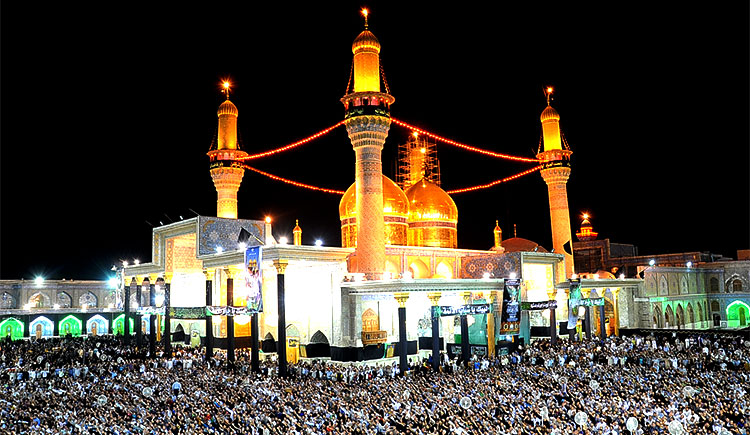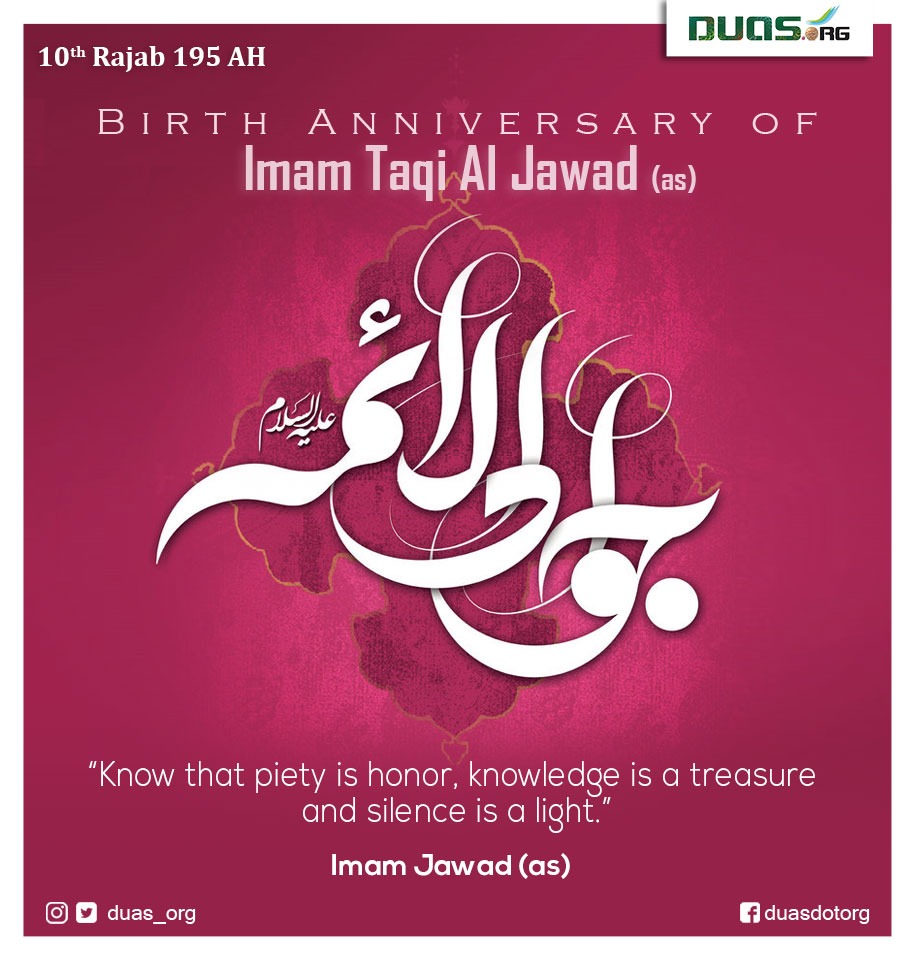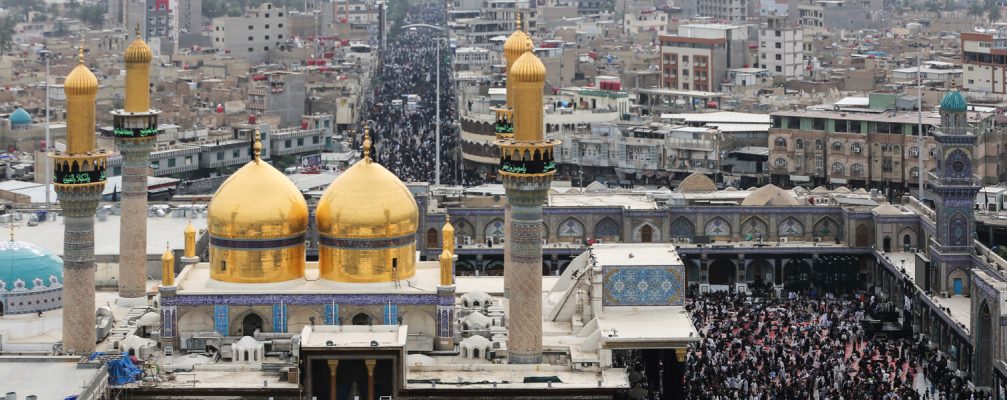Imam Abu Ja'far al-Jawad (a.s) has a collection of wonderful
words which are considered as one of the mines of the Islamic heritage and
the wonderful intellectual treasures in Islam. They have the origins of
wisdom, the bases of morals and the extract of experiments.
1. He says, �Do not anticipate matters before their time that
you may regret. Do not live just with wishes that your hearts may be hard.
Be merciful to the weak and ask for mercy from Allah by being merciful
yourselves!�
This tradition has some important points:
a. forbidding from hastiness in dealing with matters before
they become clear because it leads to regret and loss
b. Forbidding from living with wishes because it makes one
hard-hearted and away from Allah
c. Urging on being merciful to the weak and charitable to the
needy because it is the key to the mercy of Allah
2. He says, �Three things take one to the contentedness of
Allah; asking Allah for forgiveness often and always, being lenient and
giving charity. And there are three things that whoever has, will not
regret; avoiding hastiness, consulting with others and relying on Allah when
determining something.�
This tradition is rich with what takes man closer to his
Lord. It invites man to keep on asking Allah for forgiveness, to be lenient
and to give charities often and always because Allah loves these qualities
and by them man gets to the contentedness of Allah. The tradition also talks
about that which makes man happy in this life. It invites man to be
characterized by these three aspects:
a. Avoiding hastiness because it causes man many problems and
distresses. One of the poets says,
�A slow one may achieve some of his needs
and hasty one may miss his aim.�
b. Consulting with others on the affairs and avoiding
despotism because man often mistakes
c. Relying on Allah when determining to do something and
avoiding hesitation for it causes worry and upset to man�s mentality and
personality
3. He says, �How will he, whom Allah secures, be lost and how
will he, whom Allah pursues, be safe?�
In this tradition there is an invitation for man to be closer
to his Lord and to trust in His powers. It is impossible for one, whom Allah
secures, to be lost and it is impossible for one, whom Allah pursues, to be
safe.
4. He says, �The day of justice on the oppressor is severer
than the day of injustice on the oppressed.�
Imam al-Jawad (a.s) warns from practicing injustice and
oppression against people because surely Allah will avenge on the unjust
whether sooner or later. The day of justice when a wrongdoer will be
punished will be much severer than the day when an oppressed one is wronged.
5. He says, �Nothing destroys religion like heresies do.
Nothing degrades gravity like greediness does. By the ruler the subjects
become good and by supplication misfortunes are discharged.�
These words show some religious, social and political sides:
a. The heresies that are ascribed to religion distort its
truth and harm its spiritual and intellectual essence.
b. Greediness degrades the dignity of man and takes him to
dark abysses in the ignorant corners of this life.
c. If a ruler is good, his people will be good and developed
spiritually, socially, intellectually and economically.
d. Supplication to Allah discharges misfortunes and
disasters.
6. He says, �Know that piety is honor, knowledge is a
treasure and silence is a light.�
There is no doubt about these facts that Imam al-Jawad (a.s)
has said. Fearing Allah brings man honor, knowledge is the greatest and most
precious treasure in this life and silence is a light because it gives one
many advantages and keeps him safe from many troubles and problems.
7. He says, �When two men are equal in religiousness and
honor, the better of them to Allah is the politer of them�by his reciting
the Qur'an as it has been revealed and supplicating Allah with correct
language because a solecistic supplication does not go up to the Heaven.�
This tradition considers politeness as one of the best
qualities of man and that it takes man closer to Allah and that one of the
essential morals is reciting the Qur'an without solecism. Imam al-Jawad (a.s)
denies solecism even in supplications saying that a solecistic supplication
is not accepted by Allah.
8. He says, �He, who reviles (others), is answered and he,
who becomes rash, is stricken.�
It is a wonderful word that expresses the very social
reality. He, who reviles people, is certainly answered with the same, and
he, who is rash, meets perishment and destruction.
9. He says, �Knowledgeable persons are strangers because of
the many ignorant people around them.�
Scientists and scholars are strangers in a society that is
prevailed by ignorance because their knowledge and sciences are not
appreciated by the ignorant. Rather, the ignorant mock at the scientist and
this is the worse estrangement for the scientists.
10. He says, �He, who wants to live long, has to prepare a
patient heart for misfortunes.�
When man wants to live long, he has to be so patient with the
misfortunes and bad events he meets. Being impatient with misfortunes man
makes himself liable to diseases and perishment.
11. He says, �He, who acts without knowledge, damages more
than he does good.�
12. He says, �He, who has a brother (friend) in the way of
Allah, will have a house in Paradise.�
13. He says, �He, who follows his desirers, pleases his
enemy.�
One, who follows his desires, fancies and lusts, carries out
the aims of his enemy. If he obeys Iblis, he will be far from Allah and this
is the goal of Iblis. Following the desires degrades man in the society
which makes the enemies pleased.
14. He says, �The rider of lusts, his slip is not forgiven.�
He, who submits to his lusts, becomes a captive to them. He
will not be forgiven or excused.
15. He says, �The honor of a believer is in his unneediness
to people.�
16. He says, �Let the guardian of Allah in the openness not
be an enemy to Him in privacy.�
He, who pretends to be faithful before people and disobeys
Allah secretly, is a liar and hypocrite.
17. He says, �Be patient with what you hate in the way of the
truth and refrain from what you like if it leads you to desires!�
18. He says, �He, who conceals guidance from you just for the
sake of his desires, is your enemy.�
Imam al-Jawad (a.s) talks about some agents and followers of
governments who conceal from the rulers what the nation needs for reform and
development. In fact, these are enemies even if they show sincerity and
kindness.
19. He says, �Beware of accompanying an evildoer because he
is like a drawn sword whose look is nice but its effect is bad!�
20. He says, �Needs are requested by hope and they come down
by fate.�
The needs of people are requested through the expectation
from Allah and they are satisfied by the fate of Allah. The will and efforts
of man have nothing to do with that.
21. He says, �Good health is the best of blessings.�
22. He says, �When fate is decided, the wide space becomes
narrow.�
When Allah determines to take the life of someone, the space,
in spite of its greatness, becomes narrow for that someone.
23. He says, �Do not make an enemy of anyone until you know
what there is between him and Allah! If he is good, Allah will not leave him
to you, and if he is bad, then your knowing of his badness will make you
safe from him and so you do not need to make him your enemy.�
24. He says, �Being cautious of something is as much as
fearing from it and being greedy to something is as much as getting from
it.�
Being cautious of committing sins, for example, is as much as
fearing Allah. If someone fears Allah too much, he abstains from committing
any sin totally and if his fear is weak, he slips in sins and crimes. As for
greediness, if someone gets too much from something, his greediness to that
thing is great and vice versa.
25. He says, �It is enough for someone to be a traitor that
he is loyal to traitors.�
26. He says, �No one thanks Allah for a blessing that Allah
has given to him, unless he deserves more blessings before he utters the
words of thanking.�
Allah, Who has all the goodness in His hand, has promised to
give whoever thanks Him more goodness and blessings. Allah says, (If
you are grateful, I would certainly give to you more). Allah
gives more to His people when they intend to thank Him and before they utter
the words of thanking.
27. He says, �Whoever hopes in a dissolute, the least of his
punishment is that he will be deprived (of blessing) and his needs will not
be satisfied.�
Man must not hope except in his Creator; otherwise, Allah
will deprive him of blessings and will not satisfy his needs and requests.
28. He says, �Man�s death by sins is more than his death by
fate and his life by charity is more than his life by age.�
Imam al-Jawad (a.s) refers to the moral life that he who
commits sins and crimes is considered as dead among the alive people and he
who does good to his nation and country remains alive and his mention is
immortal even if he dies.
29. He says, �Who misses good manners, means (of good
results) will fail him.�
30. He says, �He, who approves a vice, is a participant in
it.�
Whoever approves a bad doing bears its sin and burden and is
considered as a partner with the doer.
31. He says, �He, who conceals his griefs, makes his body
ill.�
32. He says, �Four things assist man in his work; good
health, wealth, knowledge and success.�
33. He says, �The doer of injustice, the supporter on it and
the one who agrees on it (against others) are participants in it.�
These three kinds of people are the same in undertaking the
responsibility of injustice and they all are punished for it. Some are
directly responsible for injustice and the others indirectly by agreeing
with the unjust on their injustice.
34. He says, �Being patient with misfortunes is a misfortune
to those who rejoice at others� misfortunes.�
35. He says, �If the ignorant keep silent, people will not
disagree (with each other).�
36. He says, �The murder of man is between his two jaws.�
The end of man is often due to the thoughts he adopts. Many
free people in the world are killed because of their criticism to the
tyrants and unjust rulers.
37. He says, �People are different and each one acts
according to his own form.�
People are different in their tendencies and ways of thinking
and each of them acts according to his thoughts and beliefs.
38. He says, �People are brothers. The brotherhood that is
not in the way of Allah turns into enmity, for Allah says, (Friends
on that day will be foes one to another, save those who kept their duty (to
Allah).�
If friendship is not based on the true love that is for the
sake of Allah, and in stead it is based on personal advantages, it turns to
enmity and hatred when the advantages of friends are influenced by some
effects.
39. He says, �Being ungrateful to the blessings causes
detestation.�
It causes detestation from Allah and from people.
40. He says, �He, who rewards you with gratefulness, gives
you more than he takes from you.�
Rewarding a good doer by thanking him and spreading his
virtues is, in fact, more than his giving because it makes a good mention to
him among people which is the greatest gain to man.
41. He says, �He, who advises his brother secretly, does him
good and he, who advises him openly, does him wrong.�
Advising a brother or a friend secretly indicates sincerity
and truthfulness of advising, but if it is openly it may cause defame.
42. He says, �Whenever Allah gives a blessing to someone who
knows it is from Allah, Allah will write on that someone�s name the
gratefulness to that blessing before he will praise Allah, and when someone
commits a sin and he knows that Allah sees him and that Allah may punish him
if He likes or forgive him if He likes, Allah will forgive him before he
will ask Allah for forgiveness.�
43. He says, �A honorable, with all honor is he whose
knowledge honors him, and glory, all the glory is for him who fears Allah
his Lord.�
44. He says, �He, who witnesses something and denies it, is
like one who is absent from it, and he, who is absent from something but
accepts it, is like one who witnesses it.�
It is mentioned in the prophetic traditions that �to every
one is that which he intends� that if someone witnesses something but denies
it he will be free from its sin as if he has been absent from it and if
someone is absent from something but accepts it, its good or evil will be
recorded on him.
45. He says, �He, who listens to a speaker, worships him. If
the speaker speaks on behalf of Allah, he (the listener) worships Allah and
if the speaker speaks on behalf of Iblis, he worships Iblis.�
When someone listens to a speaker, believes in him and
follows him, he worships Allah if the speaker speaks on behalf of Allah;
otherwise, he worships the Satan.
46. He says, �Showing something before it becomes complete
spoils that thing.�
Spreading a political or social idea before it becomes
complete and compact may destroy it before it appears to existence.
47. He says, �The blessing that is not thanked becomes a sin
that is not forgiven.�
Being ungrateful to the blessing is one of the sins that are
not forgiven because it wastes the charity that should be appreciated.
48. He says, �He, who gives up humoring, comes closer to
misfortunes.�
Whoever does not humor people harms himself and meets
troubles.
49. He says, �He, who trusts to tranquility before
experience, exposes himself to perishment and bad end.�
Whoever trusts in something before testing and trying it
exposes himself to problems and losses.
50. He says, �He, who does not know the entries, the exits
will fail him.�
51. He says, �Let him, who when becomes angry oppresses
(others), not deceive you.�
This tradition warns of communicating with the unjust who
oppress people when they become angry.
52. He says, �Time uncovers hidden secrets.�
Whenever time passes, the secrets of nature and the unknown
facts of the universe will be known.
53. He says, �Whoever blames (others) without suspicion his
blame is accepted without angriness.�
54. He says, �The best worship is devotedness.�
55. He says, �Trusting in Allah is a price to every dear
thing and a ladder to every high thing.�
In the previous words, Imam al-Jawad (a.s) has dealt with
different issues in sociology, psychology, morals and the results of
different experiences in life that may benefit all the people.




